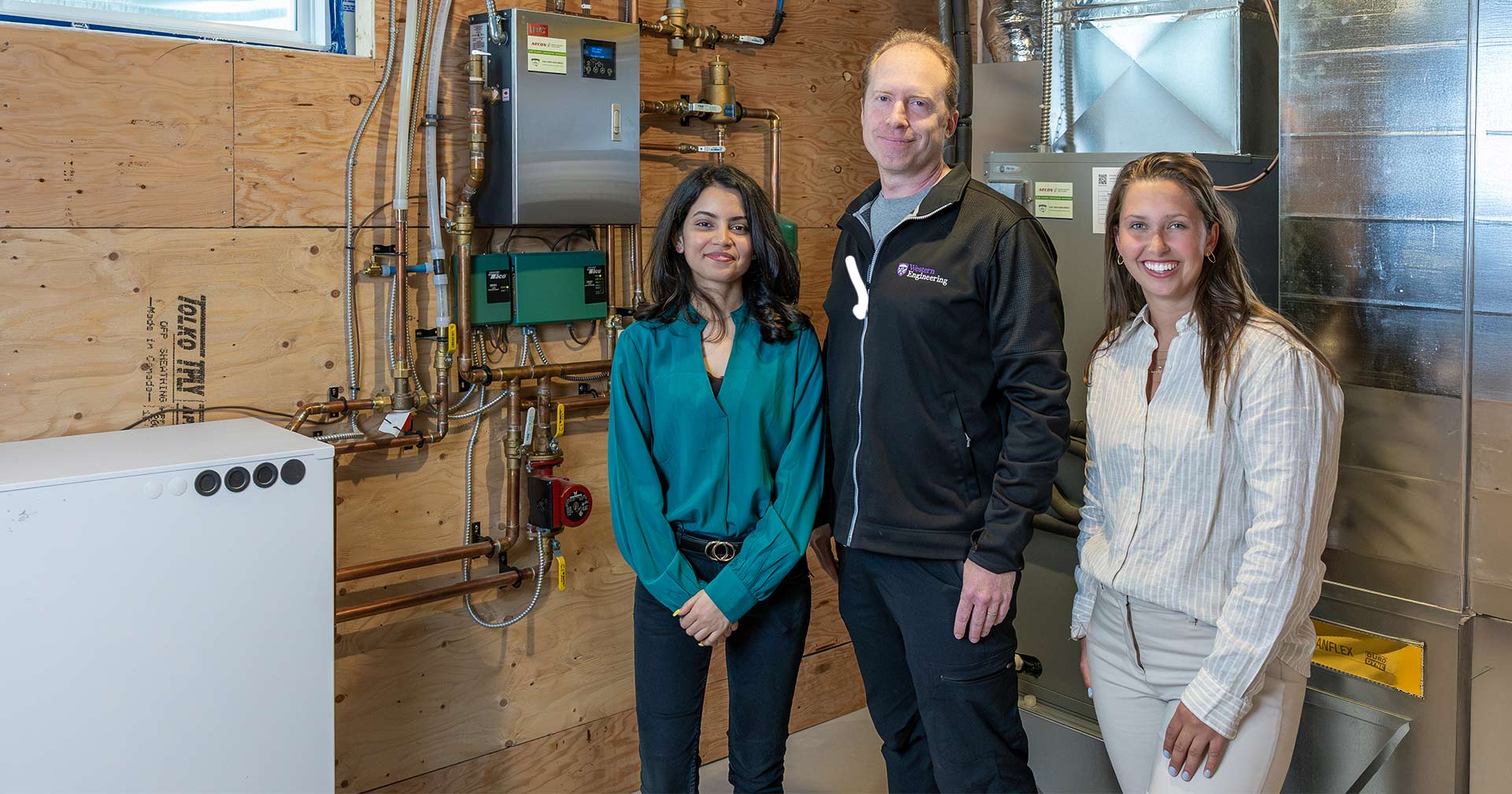Business
Western Researchers Launch Innovative House to Slash Energy Costs

A team of researchers at Western University in Ontario has developed a groundbreaking energy-efficient house that significantly reduces electricity bills and carbon emissions. This innovative home integrates photovoltaic (PV) technology, a heat pump, and a thermal battery, aiming to eliminate reliance on fossil fuels and achieve net-zero energy consumption for homeowners globally.
The project is led by Joshua Pearce, a professor at Western’s Ivey Business School, alongside PhD candidate Shafquat Rana and other engineering experts, including Anthony Straatman and Kamran Siddiqui. The house, located in Komoka, Ontario, serves as a living laboratory for ongoing research and data collection.
Preliminary findings indicate that this unique setup reduces electricity bills by an impressive 45 percent and lowers carbon emissions by 55 percent. The thermal battery, which utilizes phase-change materials such as salt or wax, enhances solar PV self-consumption by 60 percent, allowing homeowners to use energy generated on-site rather than exporting it to the grid.
“Solar costs have now undercut grid electricity costs, making solar a viable and desired option for most Canadians,” stated Pearce, who holds the John M. Thompson Chair in Innovation at Western. “This project integrates solar panels, a heat pump, and a thermal battery to provide thermal energy for heating and domestic hot water, effectively servicing the entire home.”
The researchers have established best practices that enhance energy efficiency by a factor of four compared to traditional construction methods. The heat pump converts electricity generated by the solar panels into heat, which is stored in the thermal battery for later use. Their goal is to demonstrate the technology’s scalability and safety, emphasizing its retrofitting potential for existing homes with minimal modifications.
“The aim is to validate the system’s effectiveness over the course of one year, ultimately striving to eliminate the need for fossil fuels in home heating,” said Rana. Once proven successful, the team plans to implement this system in additional homes across Canada and potentially worldwide.
The house includes advanced wiring and sensors that track energy usage and efficiency in real-time. Both Rana and Jaime Crncich, the president of Magnus Homes and owner of the home under study, can monitor data via a user-friendly app on their mobile devices and computers.
“We have a unique opportunity to both create and consume energy in our homes,” Crncich remarked. “Many homeowners are often unaware of their consumption, which is vital for sustainability and understanding their role in energy production.”
To gain further data, Rana is also monitoring a second home built by Crncich in the same subdivision that does not feature the integrated thermal battery and solar PV system. This comparison will provide insights into the performance of traditional homes using grid electricity and natural gas.
While heat pumps and thermal batteries have gained popularity in the United States, their regulatory approval in Canada is relatively new, posing challenges due to the high costs of home heating in colder regions.
“Many homes in Canada are not even up to current code, let alone equipped with state-of-the-art photovoltaic technology,” Pearce noted. “Most Canadians use natural gas or electric space heating, both of which are inefficient and costly as electricity prices continue to rise.”
Pearce highlighted that electrifying homes represents a critical pathway to long-term sustainability in Canada and globally. By harnessing renewable energy sources such as solar power, the system can provide a more efficient heating solution.
“If we can use renewable energy sources like solar to power our homes and transfer that energy to a heat pump, we can achieve efficiencies of over 300 percent,” he explained. “This approach is simply a more effective way to heat your home.”
Rana emphasized that this innovative energy approach transcends mere comfort and cost savings for homeowners. “Climate change is real, and we need everyone to contribute to the fight,” she stated. “Decarbonization of the residential sector is crucial, and integrating this sustainable setup into Canadian homes can significantly help reduce carbon emissions and address the global climate crisis.”
With their ambitious goals, the researchers at Western University are paving the way for a more sustainable future, demonstrating that energy-efficient homes can play a pivotal role in the transition away from fossil fuels.
-

 World3 months ago
World3 months agoScientists Unearth Ancient Antarctic Ice to Unlock Climate Secrets
-

 Entertainment4 months ago
Entertainment4 months agoTrump and McCormick to Announce $70 Billion Energy Investments
-

 Lifestyle3 months ago
Lifestyle3 months agoTransLink Launches Food Truck Program to Boost Revenue in Vancouver
-

 Science4 months ago
Science4 months agoFour Astronauts Return to Earth After International Space Station Mission
-

 Technology2 months ago
Technology2 months agoApple Notes Enhances Functionality with Markdown Support in macOS 26
-

 Top Stories2 weeks ago
Top Stories2 weeks agoUrgent Update: Fatal Crash on Highway 99 Claims Life of Pitt Meadows Man
-

 Sports3 months ago
Sports3 months agoSearch Underway for Missing Hunter Amid Hokkaido Bear Emergency
-

 Politics3 months ago
Politics3 months agoUkrainian Tennis Star Elina Svitolina Faces Death Threats Online
-

 Technology3 months ago
Technology3 months agoFrosthaven Launches Early Access on July 31, 2025
-

 Politics3 months ago
Politics3 months agoCarney Engages First Nations Leaders at Development Law Summit
-

 Entertainment3 months ago
Entertainment3 months agoCalgary Theatre Troupe Revives Magic at Winnipeg Fringe Festival
-

 Politics2 weeks ago
Politics2 weeks agoShutdown Reflects Democratic Struggles Amid Economic Concerns





















